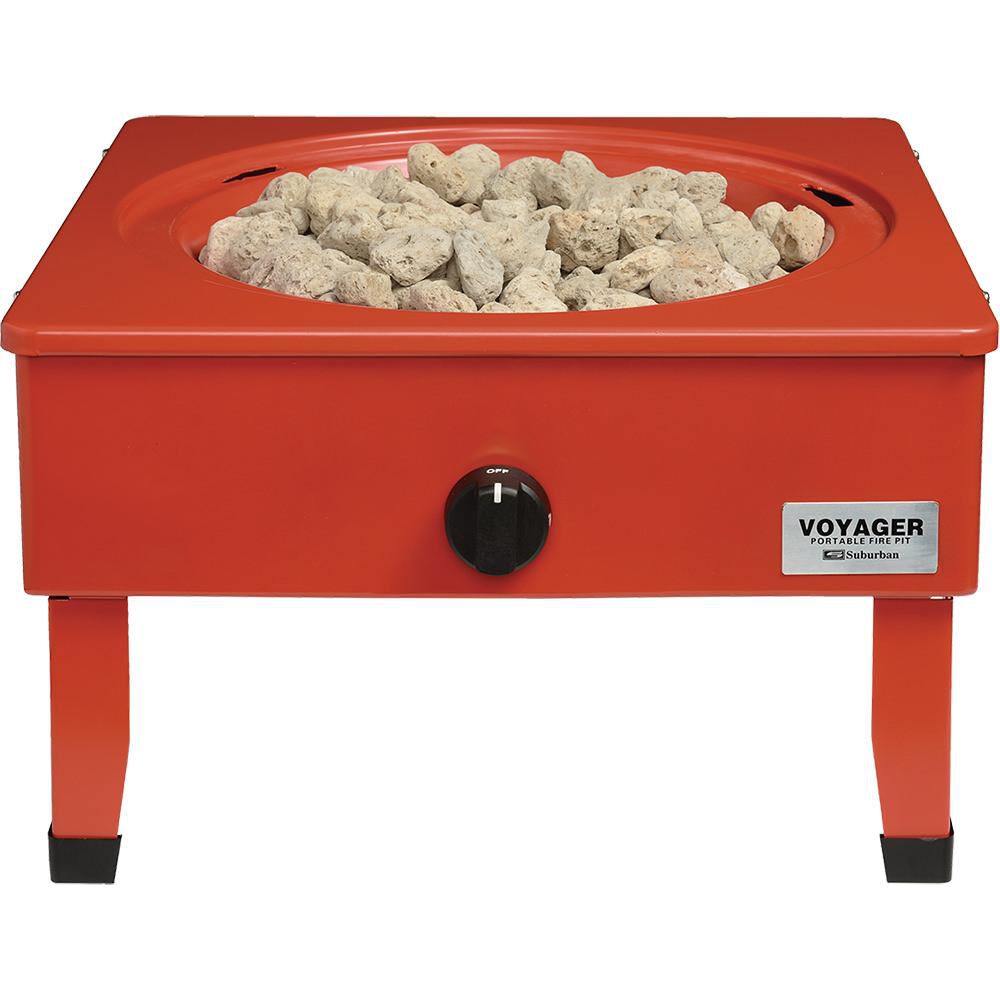The campground campfire embodies comfort and familiarity. It acts as the centerpiece to our campsites as we connect with nature and each other. Campfires are also a source of entertainment and meditation: from accumulating twigs and cotton balls, to shaving off kindling from logs, to cooking campfire snacks over the open flame–it’s all part of the serenity of camping.
But we don’t always have the pleasure of building a campfire, even at campsites with designated fire-pits.
Fire ban and fire restriction systems are in place in many U.S. National Forest for good reason: humans are the cause of nearly 85% of wildland fires—and while campfires are not always the culprit, they are notoriously difficult to fully extinguish in dry areas.
But not to worry. The RV lifestyle is about adapting to our circumstances and surroundings. Fortunately, RV camping allows for toting along safe campfire alternatives in the form of propane pits and portable patio heaters.
Exterior Lighting Campfire Alternatives
Campfires represent comfort not only as a source of heat, but also a functional light source once the sun goes down. As family and friends pull out camp chairs around the fire, bringing snacks, games, and the occasional guitar to the circle, the campfire is the primary light source where we watch and connect. If you can’t have a fire, think about replacing with appropriate outdoor lighting.

Designate a space—beneath your awning, maybe, or at a table—and get creative with some of the many outdoor lighting options available. These can connect to your RV’s electricity, but solar options charge wirelessly during the day. Courtyard lights can brighten entire areas when you use patio stringers to surround hangout areas. Pathway lights are helpful simply for moving around a dark campsite, but also delineate space and create a vibe too.
And just as a reminder, whether fire bans affect your camping area or not, personal headlamps are a must-have. Veteran campers can attest that when RV electricity goes out, a headlamp is essential for navigating campgrounds with no lights.

Fuel Campfire Alternatives
The market has several different types of portable propane fire pits that can operate by connecting to your RVs propane system or even to portable propane sources. Maybe the closest replacement for a real fire, these propane fire pits are legal in most fire restricted areas. Propane fire pits are a great alternative to the open flame for providing heat and a cook surface. Some even have the look and feel of an actual campfire, like the Camco Little Red Campfire.
Practically smokeless, set these fire pits up in a safe area (in a cordoned firepit is great) and watch as they create high flames similar to what you might see with your traditional campfire. Easy to setup and dismantle, you can control the level of heat after setting up. Never worry about embers or an unwanted fire after turning off the propane when you’re done for the night. With a propane fire pit, your fuel source is more reliable. You won’t need to stock up on firewood.

Campfire Alternatives for Heat
You might not realize how much you value the heat from a campfire until it’s not there. Now matter how much you layer up with puffy jackets and coats, you’ll still miss that warmth comes with a fire. Even in fire restricted areas, you can once again use propane to warm your campsite.
Propane patio heaters can be repurposed for campsite use, especially if you plan to be in the same area for an extended time. Some models can use portable canisters of propane—the kind you hook up to camp stoves—while others can connect directly to your RV propane source and can kick out some real warmth.
If you want to reduce your propane usage, you can also make use of electric, infrared patio heaters during the cold nights. You an even mount these to your RV if you’ll be using these often.
Paired with traditional portable electric heaters, your outdoor hangout area can offer a sense of comfort, even in frigid weather.

What You Won’t Miss With Campfire Alternatives
If you find yourself still hung-up over not being able to have a full campfire at your site, remember there are some things you won’t miss about the campfire experience.
Weather
Weather, for one, is less of a hassle: how many times have you had to deal with damp conditions, wind that won’t allow a flame, or the sporadic sprinkle that ruins your cooking situation? Take control of your surroundings with the ease of a propane flame.
Smoke
Having to move your chair around frequently to avoid the smoke-in-your-eyes blindness is frustrating. Ditch the bloodshot eyes for a serene propane-fueled campfire. Don your clothing the next morning without the strong stench of smoke clinging to your threads.
Pack Up
Most of all, without a fire you can leave a campsite quickly in the morning without having to worry about fully extinguishing the embers that create a dangerous fire hazard. Wildfires are serious, and no one wants to be the source of a devastating situation.

Yes—your campsite might feel a bit different without the traditional fire. But enjoy adapting to the situation with these placeholders knowing that you’re camping responsibly, thinking ahead, and potentially preventing serious danger to some of your favorite travel destinations. What is your favorite fire-pit for RV travel?









